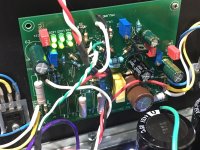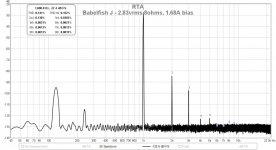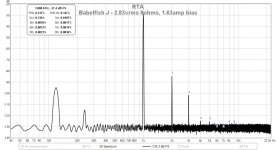I'm using 0.47R source resistors, 1 MOSFET pair, genuine Vishay IRFP240/9240 (from Mouser), 1.20 amps bias.
My smallish 100w (per channel) trafos are sagging to about 20v rails under load. That's probably the biggest deviation, but I figure that's probably good for 16w max and I am far from pushing the amp hard.
My smallish 100w (per channel) trafos are sagging to about 20v rails under load. That's probably the biggest deviation, but I figure that's probably good for 16w max and I am far from pushing the amp hard.
They should be both N Channel Mosfets. Just in case you made a mistake.
Distortion seems higher than it should be, as well as harmonic profile looks wrong.
Dropping to 0.22 Ohms Source, increasing bias to between 1.8A to 2A and changing to IRFP250 or 150 will cerainly bring significant improvements.
The results seem off though. Check all components around Aleph current source.
You might need to adjust the current gain on the aleph current source.
Did you do that?
Distortion seems higher than it should be, as well as harmonic profile looks wrong.
Dropping to 0.22 Ohms Source, increasing bias to between 1.8A to 2A and changing to IRFP250 or 150 will cerainly bring significant improvements.
The results seem off though. Check all components around Aleph current source.
You might need to adjust the current gain on the aleph current source.
Did you do that?
What AC voltage do you measure across each source resistor on the output fets?
That is while you have 2.83V rms on output?
That is while you have 2.83V rms on output?
Last edited:
Oh yes, both are actually IRFP150's - sorry, working with too many amps at once 🙂
How do you adjust current gain on Aleph source?
I adjusted the LTP bias to give 10v across 1k or 10mA. That was the only other adjustment besides output bias and offset.
How do you adjust current gain on Aleph source?
I adjusted the LTP bias to give 10v across 1k or 10mA. That was the only other adjustment besides output bias and offset.
R29=55mV acWhat AC voltage do you measure across each source resistor on the output fets?
That is while you have 2.83V rms on output?
R30=107mV ac
Last edited:
Everything seems to be operating correctly at the output.
Upping the bias to 1.8A and dropping source resistors will bring a decent improvement.
Upping the bias to 1.8A and dropping source resistors will bring a decent improvement.
Last edited:
All 3W resistors should be same value if changing values.
Ie R29 R30 R31 R32 should be same value if you drop values.
Ie R29 R30 R31 R32 should be same value if you drop values.
Ok, I will have to see if I can scrounge up another qnty 8 x 0.22R resistors. I am running 0.33R on R31/32 right now. Could that be what is throwing it off as well?
Do you have any more 0.33R resistors?
If yes put those also at R29 R30
Having different values will throw off AC current gain from the intended amount.
What you have is ok but more AC current gain will give further improvements.
If yes put those also at R29 R30
Having different values will throw off AC current gain from the intended amount.
What you have is ok but more AC current gain will give further improvements.
Last edited:
Yes, I do have more 0.33R 3w resistors. Ok, will try putting those in and boosting bias to 1.8amps. Will take a day or so to do though...
I changed the source resistors to 0.33R 3W carbon composition (vs Panasonic metal thin film), and the bias is now about 1.63 to 1.68amps (the bias pot seems to have little to no effect (7 to 8 turns no effect) on actually changing the bias, only changing Source resistors did anything, is this normal?) The distortion went dow to 0.14% to 0.15% THD and the profile is predominant H2 and H3 about -15dB lower and nothing else - so this is good. Should sound very lush and vivid. Still well above what I think it should be at (circa 0.04% or less?). Should I just leave it alone now or pursue trying to see if it can go lower in THD?
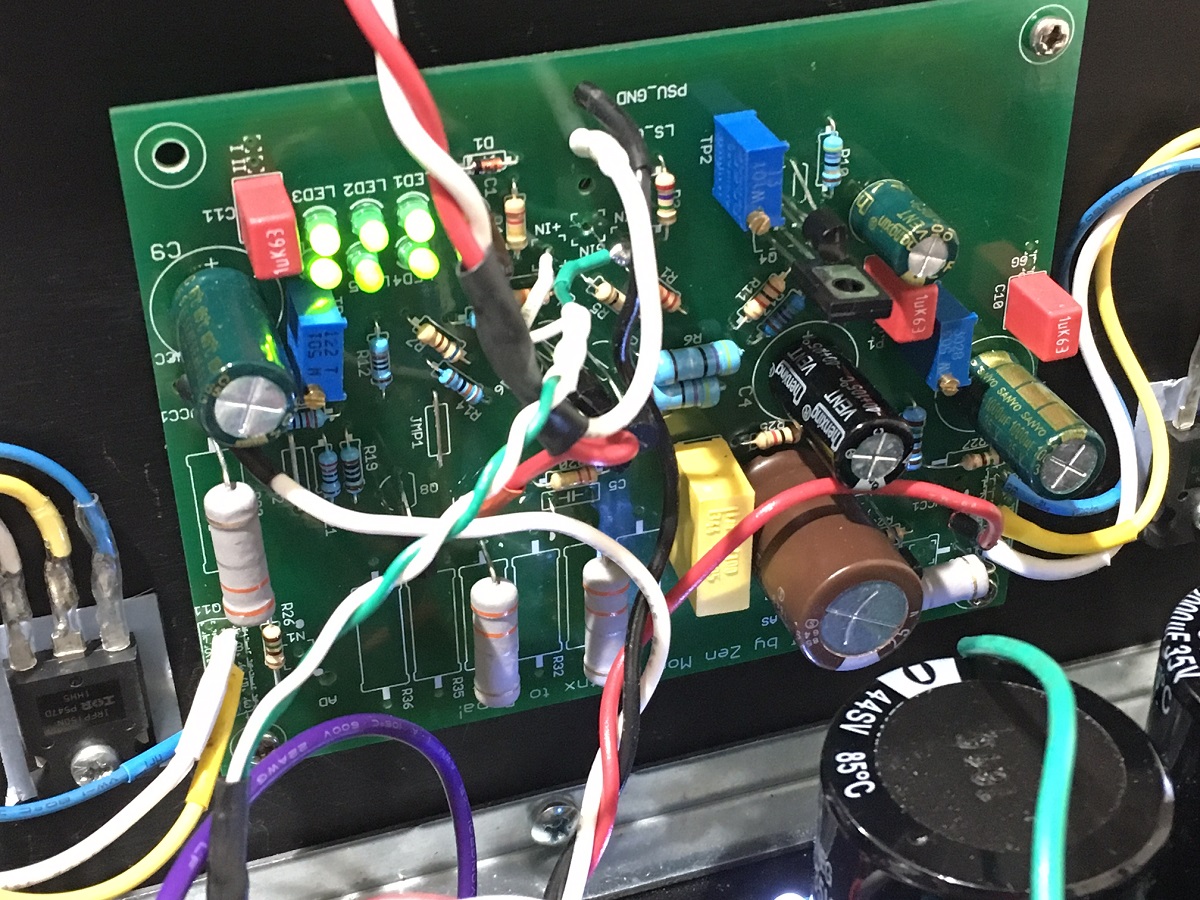
Zen Mod: what did the Spice simulations predict for the THD and the spectrum?
I am taking the data in a different location so the mains peaks and harmonics a little different.
Left Channel:
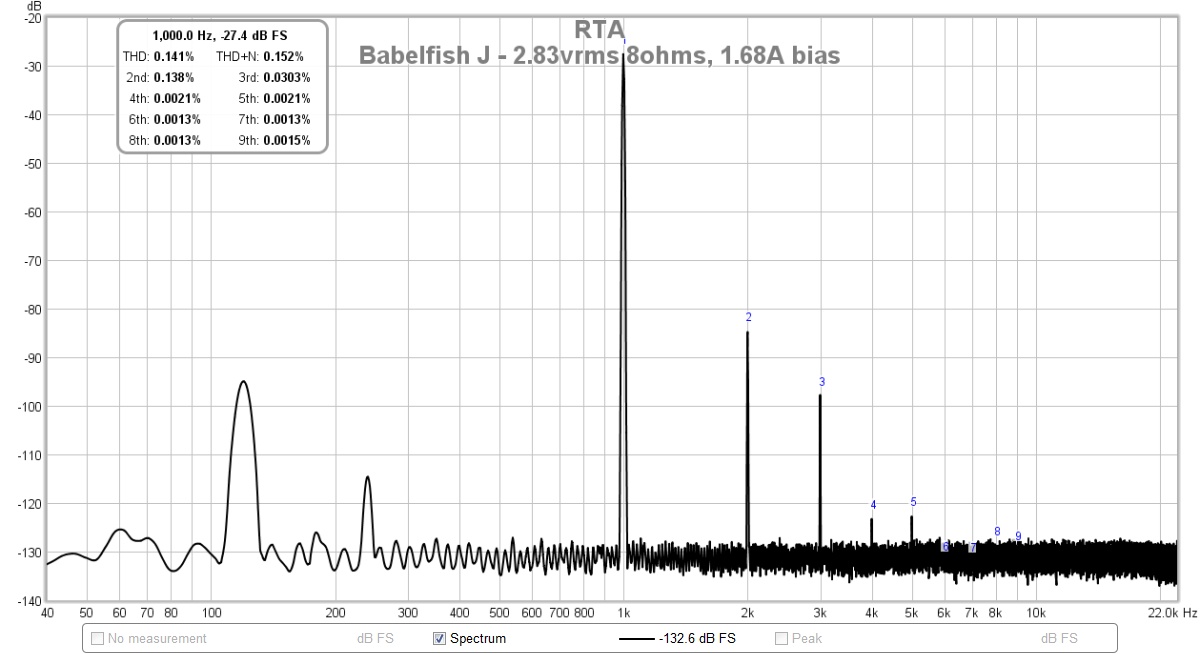
Right Channel:
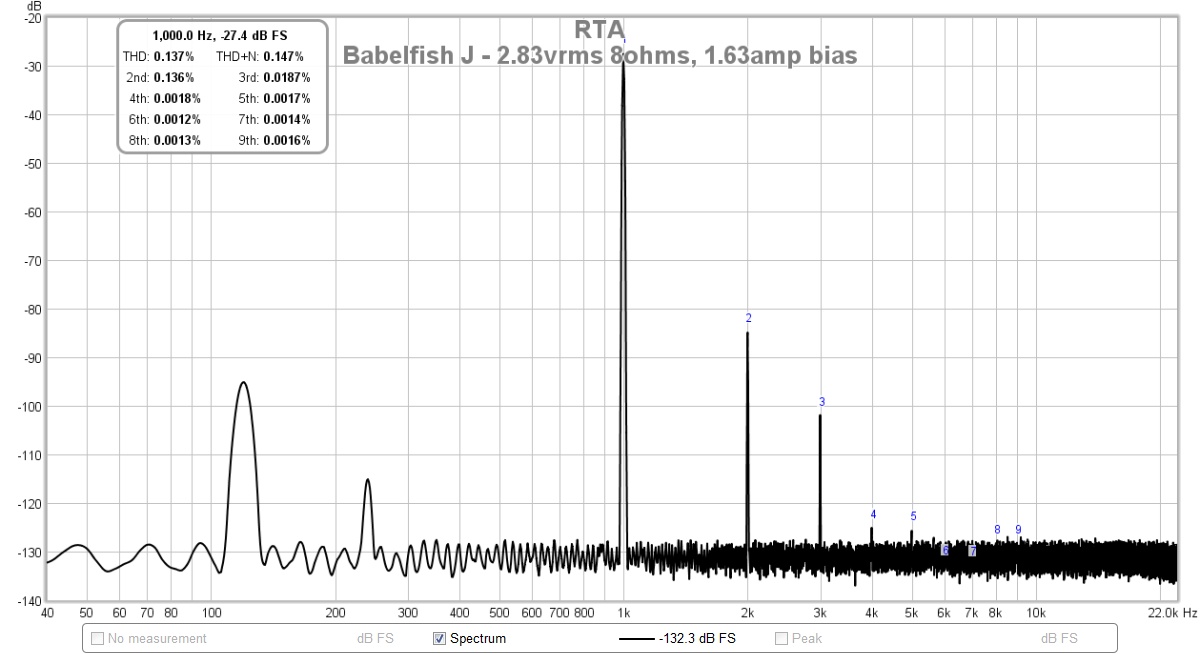
Zen Mod: what did the Spice simulations predict for the THD and the spectrum?
I am taking the data in a different location so the mains peaks and harmonics a little different.
Left Channel:
Right Channel:
Attachments
TP3+R24 combined value is what's influencing Iq , besides voltage across R29
so - lesser ohms of TP3+R24 ,Iq lower ..... more ohms there , R29 is dominating
regarding THD ........ I would say that's good enough , not taking in account methodology of measurements ........ what's most important is that you confirmed K3 15db down vs. K2
Spice is ( as we know always enthusiastic) predicting something as 0.015% , 8Vpp@8R , with 0R33 biggies and app. 1A6 Iq
more oomph and THD goes even lower , but who cares
so - lesser ohms of TP3+R24 ,Iq lower ..... more ohms there , R29 is dominating
regarding THD ........ I would say that's good enough , not taking in account methodology of measurements ........ what's most important is that you confirmed K3 15db down vs. K2
Spice is ( as we know always enthusiastic) predicting something as 0.015% , 8Vpp@8R , with 0R33 biggies and app. 1A6 Iq
more oomph and THD goes even lower , but who cares
Thanks, ZM. I'll stop now and just enjoy it. Been listening for past couple of hours on my Scan Speak 10F/8424 tops plus RS225-8 FAST speaker. Very nice sound.
now .... you can just contemplate what's possible with more sensitive and more efficient speakers .....
Maybe run a square wave then if all good, you're all good.
The only thing I would suggest is if you have room for 2 x 200VA transformers I would put those in.
2 x 100VA is probably not really adequate for this amp. You could use those 100VA transformers on another amp or preamp.
The only thing I would suggest is if you have room for 2 x 200VA transformers I would put those in.
2 x 100VA is probably not really adequate for this amp. You could use those 100VA transformers on another amp or preamp.
what ? those are 100VA Donuts ?
I'm using 250VA ones for dual mono ..... 200VA should be minimum
not saying that THD is going crazy because of that , at 1W , but things will go berserk up
or , if one likes Musical Fidelity approach ..... 80VA thingie feeding amp with 80W of dissipation

I'm using 250VA ones for dual mono ..... 200VA should be minimum
not saying that THD is going crazy because of that , at 1W , but things will go berserk up
or , if one likes Musical Fidelity approach ..... 80VA thingie feeding amp with 80W of dissipation

My smallish 100w (per channel) trafos are sagging to about 20v rails under load.
It's advisable to use 200VA per channel bare minimum.
Determine what is the biggest trafos you can fit and go with those.
I got the smaller ones mostly as an experiment to see if the ground loop noise could be fixed, Did not want to plunk too much down before I knew that was the fix. I can use these for other projects now and will probably order a pair of 200VA's.
I have tried this with a 96dB/1w full range dual PA130-8 with an AMT super-tweeter and it does indeed come alive with more efficient speakers. It's really not sufficient for the 10F/RS225 FAST which really needs a 100w/ch amp to shine.
I have tried this with a 96dB/1w full range dual PA130-8 with an AMT super-tweeter and it does indeed come alive with more efficient speakers. It's really not sufficient for the 10F/RS225 FAST which really needs a 100w/ch amp to shine.
- Home
- Amplifiers
- Pass Labs
- About possible Babelfish J interest

